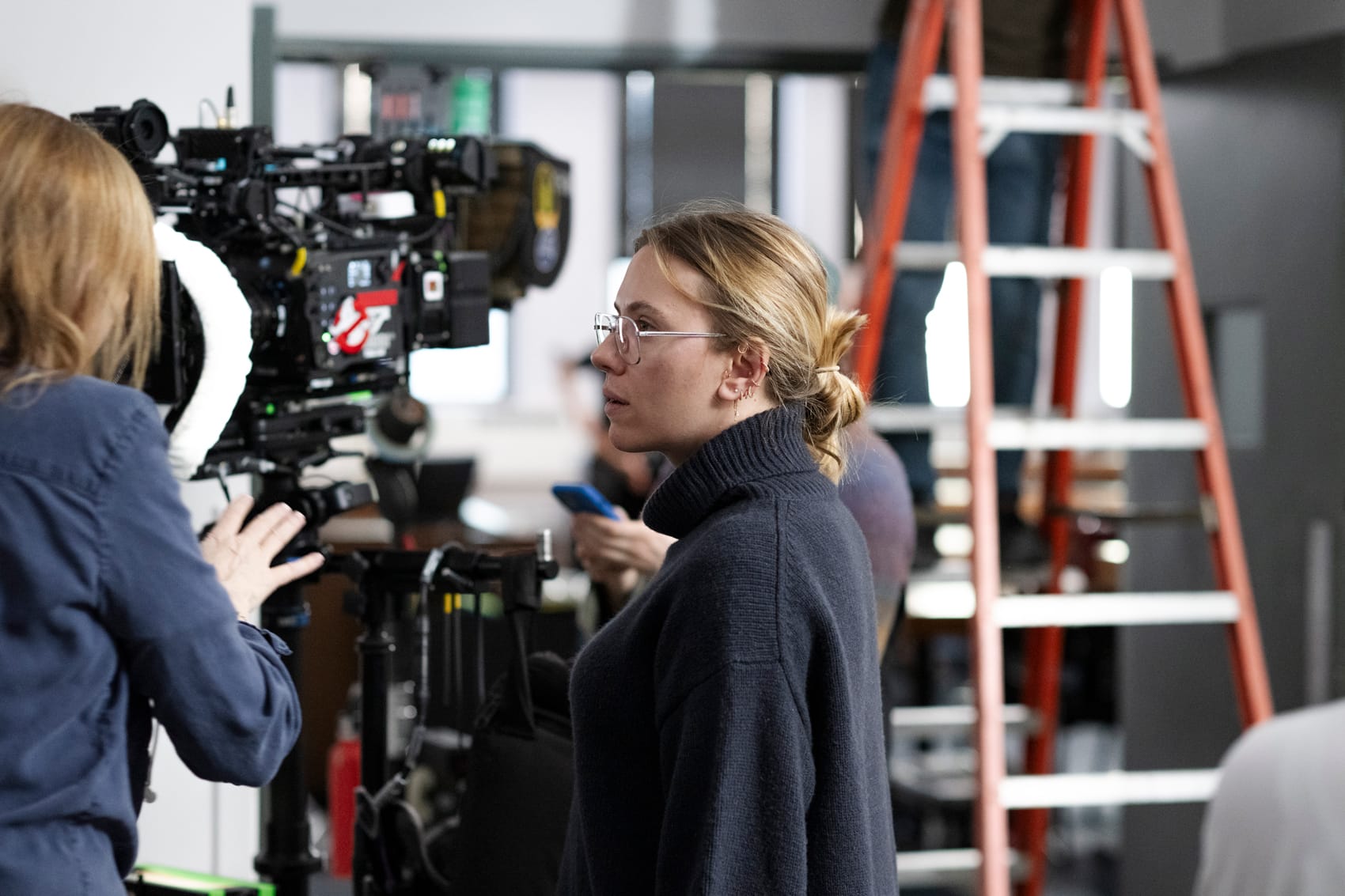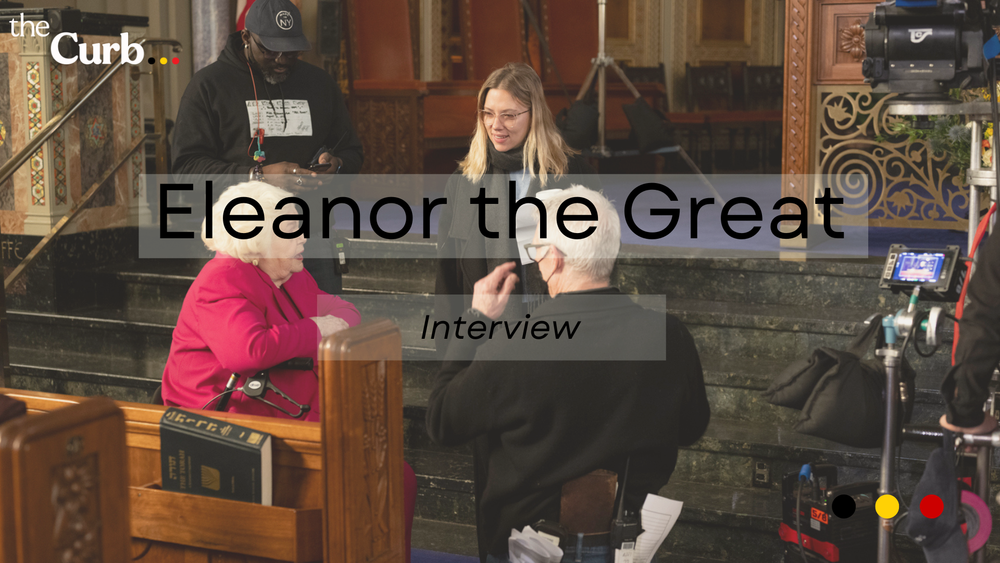If Auguste Rodin’s Thinker is the classical embodiment of concentration, then Scarlett Johansson answering a question might be its contemporary counterpart. In a small room of a Cannes hotel, she arrives immaculate – minimal makeup, a cream-pleated dress and her producing partner Jonathan Lai moving in quiet step behind her. She settles into a rounded chair, jokes about the boat party that followed last night’s world premiere, and for a moment the whole scene feels staged: a carefully arranged tableau designed to send her film, Eleanor the Great, into the world with every possible advantage. I, like everyone else in the room, am simply playing my part.
Johansson’s film follows Eleanor (June Squibb), a 92-year-old Jewish woman in Florida who shares a modest apartment with Bessie, a Holocaust survivor. As a girl, Bessie witnessed her brother’s death; in an early scene she tells the story for the first time, confiding in Eleanor with the ease of their decades-long friendship. When Bessie dies, Eleanor is unmoored. She moves in with her daughter Lisa (Jessica Hecht) and grandson Max (Will Price) in New York, her loneliness deepening until she drifts into a Holocaust survivor support meeting. There, almost by accident, she begins telling Bessie’s story as if it were her own. Her account captures the attention of Nina, a young journalism student played by Erin Kellyman, and a robust, but complicated friendship begins.
When Johansson speaks about the film, her intensity is almost startling. She listens with her whole body, going still in a way that makes the questioner feel momentarily exposed, as though the weight of the film’s future is now balanced on your phrasing alone.

Eleanor the Great is a very personal film, and for me at least, a really surprising story for a first time director to tell. What did you learn about yourself making this film?
Scarlett Johansson: There were a lot of surprising things about the process because I had never directed before. One of the biggest revelations was realising how much of the work felt like an extension of what I’ve already been doing for years. You worry about the technical parts — where do I put the camera, how do I shotlist this, am I going to have the right answers? But then you discover you actually know a lot more than you think you do.
Actors spend thousands of hours on set. You pick up an understanding of how the machine works, what every department needs to be able to do their job, how a day naturally flows. You may not know how to do everyone’s job, but you know what they need, and that’s invaluable when you’re suddenly the one guiding all those departments. That was a form of knowledge I didn’t fully appreciate until I was suddenly relying on it.
But you’re supposed to have the answer to every question a crew member might have, isn’t the pressure of leadership a different pressure than acting?
SJ: You don’t actually have to have the answer every time. I think leadership also involves recognising when you don’t know and staying curious enough to discover the solution. I was incredibly fortunate to work with an extraordinary group of very experienced people – our DP, our production designer, our composer, our costume designer, our producers. They’ve all put in their thousands of hours too.
So we found answers together. And honestly, people only show up for a small, intimate, low-budget film like this because they believe in it. No one’s doing it for the money. You’re relying on a lot of favours, asking people to trust the project and trust you. I think the script moved people. It touched something, and they wanted to be part of that. That collective belief was a huge source of strength for me.
Could you talk a bit about developing the script? The characters feel so vivid, as though they moved from the page to the screen with great care. Was there much improvisation on set?
SJ: Not much, no. Occasionally in montage sequences or looser moments, we’d let things play out more naturally. But the script itself was very clear and direct. For those montage sequences, the actors would just enjoy each other's company, which was pretty authentic. That's the funny thing about being a director that you realize, oh, yeah, you don't have any fun. Everybody else has fun. Everybody else is having dinner after work and watching Dateline and eating pizza and all that fun stuff that you do. There's a sorority kind of vibe to it. But then when you're directing, you don't do any of those things. What was most exciting for me was watching actors bring their instincts, histories, and ideas to their characters. That’s the great privilege of directing – you get to observe all these creative minds interpreting and deepening what’s on the page. June, Erin, Chiwetel, Jessica, they all had very strong ideas of who these people are, what they want, what are the stakes, what are their shortcomings? I mean, that's all stuff that I'm curious about too.
Everybody has experienced grief at a certain point in their lives. Were you able to bring that on a personal level to your characters and to your direction?
SJ: Absolutely. I think everyone has experienced grief in some form. When a script is good, it creates a natural pathway to those memories and emotions without forcing it. For me, the film isn’t just about loss; it’s about what grief reveals. The things we hold onto, the forgiveness we hope for, the forgiveness we try to earn. Eleanor, for example, does something quite extreme – arguably unforgivable – but the audience still empathises with her because we understand the love behind her choices. That complexity was important to me. Grief is rarely clean. It’s layered with guilt, devotion, longing, sometimes even humour. The film tries to honour that.
What do you think would be the best ways to improve the opportunity of female directors in the entertainment business and also in independent cinema?
SJ: The best way to do it is to support female filmmakers. You know, of course, it seems obvious, but I think there's, you know, there's different initiatives that support that. Alma Harrell has a great one that she's pioneered in the commercial space. What's her org called, Jonathan? (she turns to her production partner Jonathan Lia who pulls out his phone, she turns back to me) Working with filmmakers like that and with initiatives like that is also very helpful. The premise of it is that if you're pitching on a job, the company commits to considering a female director. So, we're going to consider this person's pitch in a way that's meaningful. So, you know, I think also again, supporting those kinds of organisations are a great way to do it too. (“Free the Work,” says Lia.) Free the Work.
Could you talk about your experience working with June Squibb?
SJ: It was like a dream. She's so amazingly sinewy and sharp. You're working with somebody whose entire career is dedicated to one thing, which is understanding the process, what it is to be an actor. You're figuring that out for over 70 years. So by the time I’m working with June, you’re working with someone who is pretty close to figuring it out. Directing her was incredible. First take, fantastic. Second take. Apply a couple of notes. Great third take. It's even different and interesting to another variation. By the third or fourth take, there would be a completely perfect take that we probably used in its entirety, which is just amazing. And it's not just a note on a performance, but it's also continuity or line change, so it's a lot. When you see an actor that's that sharp, it's just awesome. The last thing I was worried about was June delivering. She delivered every time.
Was there a moment you realised that you had the confidence to become a director?
SJ: Not really. Directing is so consuming in all ways. Like, you really can't do anything else. You have no family life, you have no time for anything, especially during the production. The physical production and the prep is so intense. I couldn't have confidently made this film 10 years ago. I think it's also just being comfortable taking the time to do it and not feel like you're… I don't know, taking a completely different career path, or you're missing some opportunity and being okay with missing that opportunity and able to focus on getting this right.
At the screening I attended, people were crying. When you were working on the film, how did you ensure the film would have this emotional impact? What decisions were you making?
SJ: Oh, the script made me cry. And watching June and Erin work made me cry. My producing partner, Jonathan, well, he cries at everything, so he doesn’t count (Jonathan nods), but even during editing sessions with Harry (Jierjian), we were often complete messes.
Dustin’s score only amplified that. There were moments where I’d listen to the music without watching the footage and still be moved. But none of it is manipulative; it’s the nature of the story. The subject matter is very moving. Forgiveness is also very moving.
Especially now.
SJ: Yeah, maybe especially now, too. To me, it feels very moving.
Screening or Streaming Availability from JustWatch:

